
The United States Navy Sea, Air, and Land (SEAL) Teams, commonly known as Navy SEALs, are the U.S. Navy's primary special operations force and a component of the Naval Special Warfare Command. Among the SEALs' main functions are conducting small-unit special operation missions in maritime, jungle, urban, arctic, mountainous, and desert environments. SEALs are typically ordered to capture or kill high level targets, or to gather intelligence behind enemy lines. SEAL team personnel are hand selected, highly trained, and possess a high degree of proficiency in direct action (DA), and special reconnaissance (SR), among other tasks like sabotage, demolition, intelligence gathering, and hydro-graphic reconnaissance, training, and advising friendly militaries or other forces.

Joseph Maguire is an American officer who served as Director of the National Counterterrorism Center and Acting Director of National Intelligence under President Donald Trump. He retired from the United States Navy as a vice admiral in 2010 after 36 years of military service. Prior to retiring from active duty, he was the deputy director for strategic operational planning at National Counterterrorism Center (NCTC).

Joseph Devereux Kernan is a retired United States Navy vice admiral and the former under secretary of defense for intelligence. His last military assignment was serving as the military deputy commander of the United States Southern Command (USSOUTHCOM), Miami, Florida, from May 23, 2011, to September 2013. He was the second-in-command of one of nine unified commands under the Department of Defense.
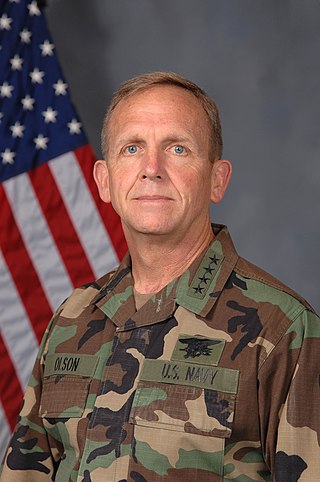
Eric Thor Olson is a retired United States Navy admiral who last served as the eighth Commander, U.S. Special Operations Command (USSOCOM) from July 2, 2007 to August 8, 2011. He previously served as Deputy Commander, U.S. Special Operations Command from 2003 to July 2007. Olson was the first Navy SEAL ever to be appointed to three-star and four-star flag rank, as well as the first naval officer to be USSOCOM's combatant commander. He took command from Army General Bryan D. Brown in 2007. Brown and Olson had served together at the SOCOM headquarters in Tampa for four years. He retired from active duty on August 22, 2011 after over 38 years of service. He relinquished command of SOCOM to Admiral William H. McRaven the same day.

William Harry McRaven is a retired United States Navy four-star admiral who served as the ninth commander of the United States Special Operations Command (SOCOM) from August 8, 2011 to August 28, 2014. From 2015 to 2018, he was the chancellor of The University of Texas System.

The Naval Special Warfare Development Group (NSWDG), abbreviated as DEVGRU and commonly known as SEAL Team Six, is the United States Navy component of the Joint Special Operations Command (JSOC). The unit is often referred to within JSOC as Task Force Blue. DEVGRU is administratively supported by Naval Special Warfare Command and operationally commanded by JSOC. Most information concerning DEVGRU is designated as classified, and details of its activities are not usually commented on by either the United States Department of Defense or the White House. Despite the official name changes, "SEAL Team Six" remains the unit's widely recognized moniker.

In the United States Navy, United States Coast Guard, United States Public Health Service Commissioned Corps (USPHS), and National Oceanic and Atmospheric Administration Commissioned Officer Corps, captain is the senior-most commissioned officer rank below that of flag officer. The equivalent rank is colonel in the United States Army, Air Force, Space Force, and Marine Corps.

Scott P. Moore, is a retired Rear Admiral of the United States Navy. Moore is a former member of SEAL Team TWO and previously served as commanding officer of the Naval Special Warfare Development Group from 2007 to 2009. He is an Admiral Circle member for the exhibit SEAL: The Unspoken Sacrifice. He is active in the Navy SEAL Foundation.
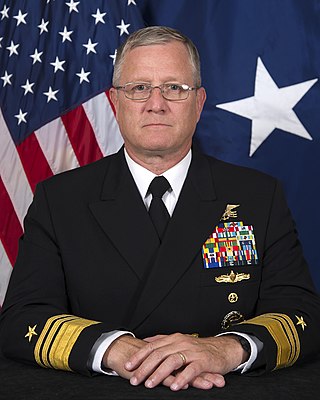
Timothy Gerard "Tim" Szymanski is a retired United States Navy vice admiral who last served as deputy commander of United States Special Operations Command from October 15, 2018 to December 2021. He is the former commander of United States Naval Special Warfare Command in Coronado, California.
The Fat Leonard scandal is an ongoing investigation and prosecution of corruption within the United States Navy during the 2000s and 2010s. It has involved ship support contractor Glenn Defense Marine Asia (GDMA), a Thai subsidiary of the Glenn Marine Group. The Washington Post called the scandal "perhaps the worst national-security breach of its kind to hit the Navy since the end of the Cold War." The company's chief executive, president, and chairman, Malaysian national Leonard Glenn Francis bribed a large number of uniformed officers of the United States Seventh Fleet with at least a half million dollars in cash, plus travel expenses, luxury items, parties and prostitutes, in return for classified material about the movements of U.S. ships and submarines, confidential contracting information, and information about active law enforcement investigations into Glenn Defense Marine Asia.
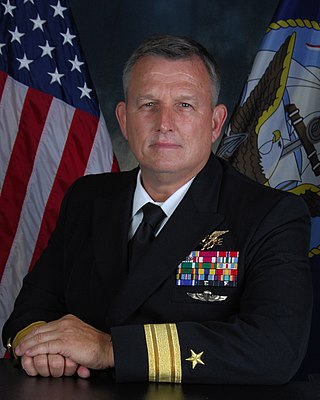
Edward G. Winters III is a retired United States Navy rear admiral who commanded the Naval Special Warfare Command from Sept. 2008 to June 2011. He also previously served as commanding officer of the Naval Special Warfare Development Group from 2003 to 2005.

Sean Averell Pybus is a retired United States Navy vice admiral who last served as the deputy Commander, United States Special Operations Command from 2014 to 2016. He previously served as the Commander, Naval Special Warfare Command from 2011 to 2013.

Collin Patrick Green is a vice admiral in the United States Navy who serves as the deputy commander of the United States Special Operations Command since December 16, 2021. He most recently served as Chief of Staff of the United States Special Operations Command. He graduated and was commissioned from the United States Naval Academy in 1986. Green also holds degrees from the Catholic University of America and United States Naval War College. He is a naval special warfare officer and previously served as commander of United States Special Operations Command South from 2016 to June 2018.
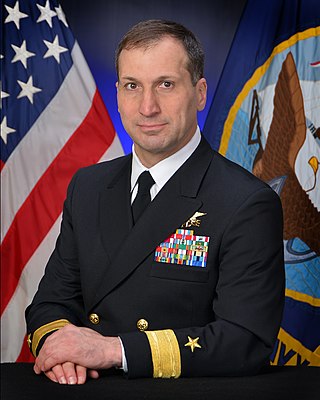
Alexander L. Krongard, is a retired United States Navy SEAL. He retired from the United States Navy as a rear admiral in 2016 after 31 years of military service. He served as the Deputy Commander of United States Africa Command and previously commanded Naval Special Warfare Group ONE.

Keith Bently Davids is an American United States Navy special warfare officer with the rank of rear admiral. He has served as the commander of Naval Special Warfare Command since August 19, 2022. He was the commander of U.S. Special Operations Command South, United States Southern Command from 2020 to 2022. Previously, he served as director of the White House Military Office during the Presidency of Donald Trump. Earlier in his career, he was commanding officer of the Naval Special Warfare Center and SEAL Team One.

Frank Mitchell Bradley is a United States Navy vice admiral who serves as the commander of Joint Special Operations Command since August 10, 2022. He most recently served as the Commander of Special Operations Command Central from July 20, 2020 to July 1, 2022. Previously, he served as the Assistant Commander of the Joint Special Operations Command from 2018 to 2020.
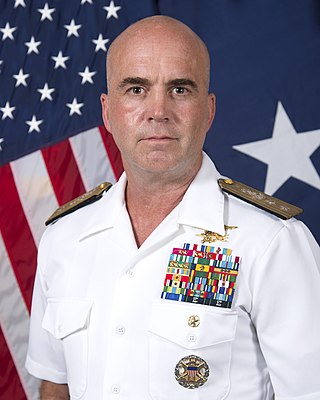
Hugh W. Howard III is a retired United States Navy rear admiral who commanded the United States Naval Special Warfare Command from September 11, 2020 until August 19, 2022. He was previously the Commander of Special Operations Command Central from July 19, 2018, to July 20, 2020.



















